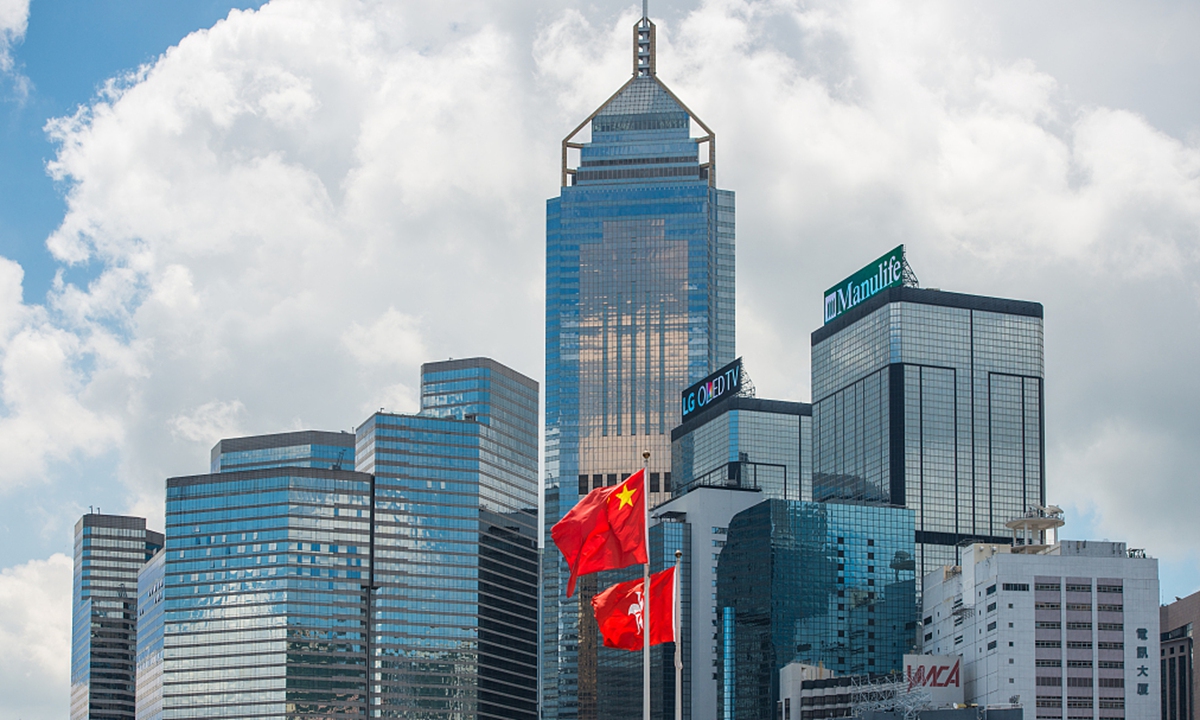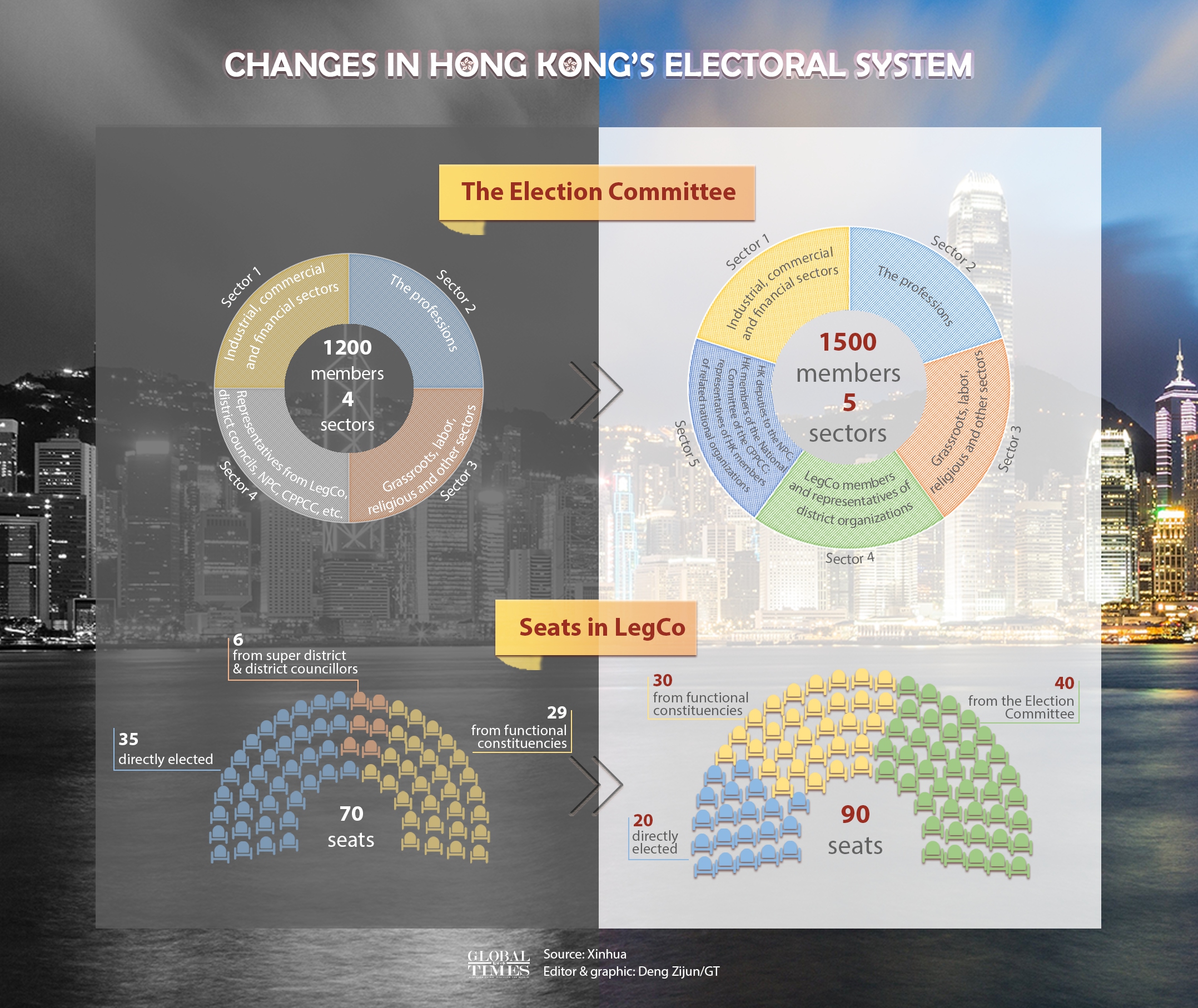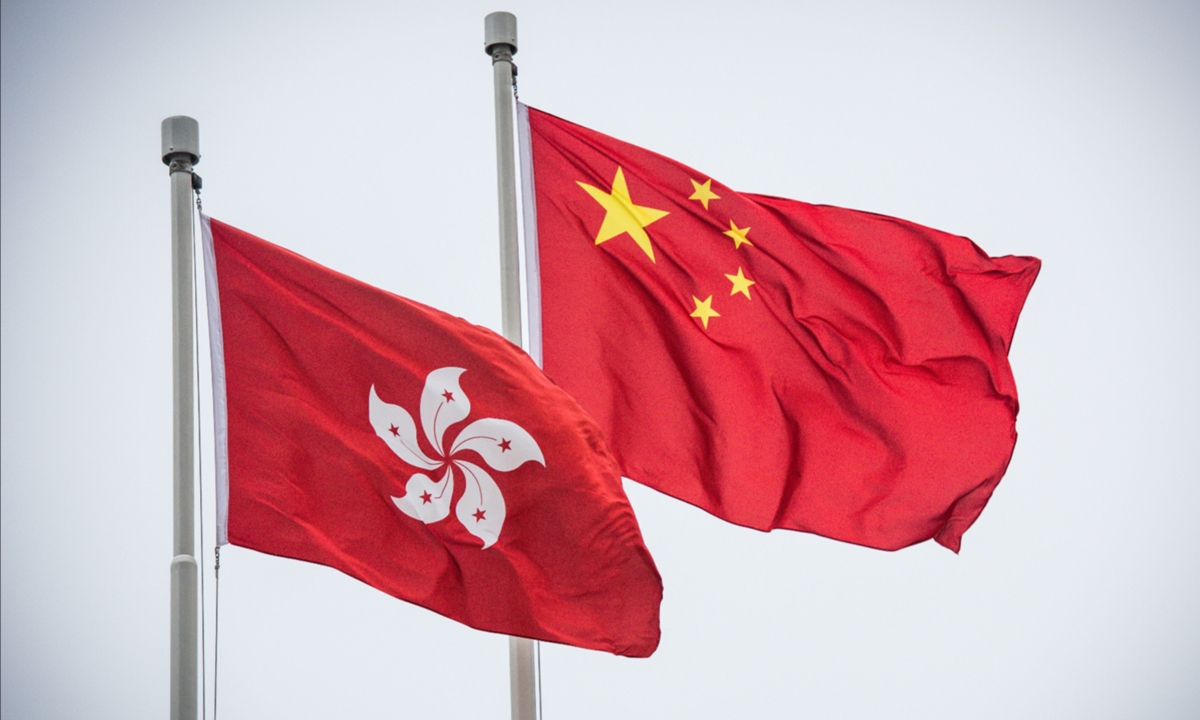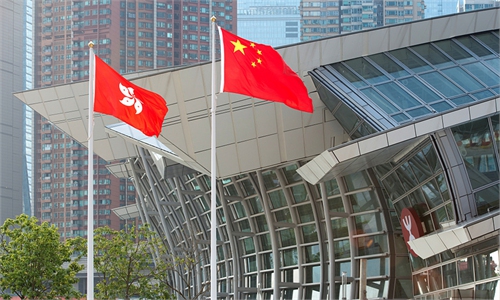
Hong Kong File Photo: VCG
Chinese top lawmakers unanimously approved the Hong Kong electoral reform plan on Tuesday, with revised measures for electing the Hong Kong chief executive and the formation of the Legislative Council (LegCo), which is seen as another major step in tackling the loopholes in the city's governance structure. The plan was approved after two-day meeting of the Standing Committee of China's top legislative body and rounds of discussions.The detailed measures, with the aim of reaching a balanced and expanded public participation, are not designed to "largely reduce democratic representation," as some Western media analyzed, but to ensure the purpose of the local elections are to elect those who truly serve the country, the Hong Kong Special Administrative Region (HKSAR) government and the public interest, rather than letting anti-China figures turn the political stage into manipulation platforms to paralyze the government and to engage in subverting the State power, observers said.
The amended Annex I and Annex II to the Basic Law of HKSAR, which specify the method for selecting the HKSAR chief executive and the method for the formation of the HKSAR Legislative Council and its voting procedures, were passed at the closing meeting of the 27th session of the Standing Committee of the 13th National People's Congress (NPC).
Chinese President Xi Jinping on Tuesday signed presidential orders to promulgate the amended annexes.
Li Zhanshu, chairman of the NPC Standing Committee, presided over the meeting, which was attended by 167 members of the NPC Standing Committee.
It will bring the social unrest-stricken city into a new chapter in its political development, and the overhaul is to be carried out based on the firm support of public opinion to ensure the principle that only patriots govern Hong Kong can be implemented.
"Those who took part in the law amendment truly understand the political spectrum in Hong Kong, especially some urgent issues within the governance structure that need to be handled, leaving no room for radical anti-government figures to use ill-intentioned tactics to bring the city into another political crisis," Andrew Fung Wai-kwong, a Hong Kong political commentator, told the Global Times on Tuesday.
The top legislative body has made sure that every detail of the overhaul fits into the electoral system and that there are no loopholes in the amendment process in order to achieve four major targets - safeguarding national security, fully implementing "one country, two systems," "patriots governing Hong Kong" as well as preventing external hostile forces from entering the local governance structure, according to senior experts on Hong Kong affairs.
Two major points that make clear the direction of the Hong Kong electoral overhaul include setting up the vetting committee and restructuring and increasing the stake of the Election Committee in the political system, according to some experts.

Changes in Hong Kong's electoral system Infographic: Deng Zijun/GT
Details in focus
As some observers have already suggested setting up a vetting committee to screen those who run for public office, the amended Annex I stipulates that the Candidate Eligibility Review Committee will be responsible for reviewing and confirming the eligibility of candidates for Election Committee members and for the office of chief executive.
The Committee for Safeguarding National Security of the HKSAR shall, on the basis of the review by the department for safeguarding national security of the Police Force of the HKSAR, make findings as to whether a candidate for the Election Committee member or for the office of the chief executive meets the legal requirements and conditions of upholding the Basic Law and swearing allegiance to the HKSAR.
Another focus of the overhaul is the role of the Election Committee, which has been strengthened. A new section of 300 members has been added, taking the total number of seats at the committee from 1,200 to 1,500.
This section is comprised of HKSAR deputies to the NPC and HKSAR members of the National Committee of the Chinese People's Political Consultative Conference (CPPCC).
Also 40 seats in the LegCo will be given to those from the Election Committee, and all these measures enhancing the role of the committee also make it much more representative by including the interests of various sectors, Tam Yiu-chung, a member of the Standing Committee of the NPC, told the Global Times on Tuesday.
"The committee will play a core role in enabling political stability," he said.
Other changes include the proportion of seats in the LegCo, which now includes 40 seats from the Election Committee, 30 from functional constituencies and 20 which are directly elected, with the number of seats increased from 70 to 90.
The current seats of super district councilors were scrapped, while newly added seats include HKSAR deputies to the NPC and HKSAR members of the National Committee of the CPPCC - the top political advisory body - as well as representatives from Hong Kong members of relevant national organizations.
As for the Election Committee, the 117 seats returned from the district councilors have been scrapped, and the 183 new seats will be elected from regional organizations include district fire safety committees, anti-crime committees and representatives of associations of Hong Kong residents in the Chinese mainland.
Most attacks on the reform plan are due to the reduction in the number of directly elected seats, but does it really mean the retreat of the democratic process? Some experts raised this question. "In any country around the world, no matter what kind of electoral system is in place, it has to make sure the country is governed by patriots, instead of pushing forward the democracy for so-called democracy," Fung said.
In some Western countries which anti-government figures in Hong Kong are looking up to for support, their systems do not guarantee "one person one vote," Fung said. For example, the UK's upper chamber, the House of Lords, are mostly appointed, and the position of British prime minister is assumed by the leader of the party that wins most seats. And if the party leader is changed, then the prime minister will be changed, but British voters have no say in that, Fung further explained.
Also, excluding district councilors from the Election Committee is in line with Article 97 of the Basic Law to enable "de-politicization" of the district councils, making them return to their original purpose of serving communities rather than becoming anti-China platforms to paralyze the government and damage "one country, two systems," according to Tam.

Hong Kong File Photo: VCG
Political prospects
A number of central and local authorities have voiced support for the Hong Kong electoral system overhaul, saying that it will further improve the city's political and social environment, the rule of law and business environment, and usher in an even brighter future for Hong Kong's development.
Lau Siu-kai, vice-president of the Chinese Association of Hong Kong and Macao Studies, told the Global Times on Tuesday that the amendment shows that the central government firmly grasps the right to create, initiate, and decide on political reform in Hong Kong, as the previous five-step process in Annex I and II is no longer applicable.
"It means that, unless the central government brings it up, the HKSAR government has no right to take the initiative of bringing up the political reform plans - the reform plans for electing the chief executive and LegCo lawmakers," he said.
From the arrangement for district councilors, it's clear the central government will sweep out those political forces who go against "one country, two systems," national security and local governance.
Only when those four major targets are achieved, can the city's democratic process go forward progressively, Lau added.
HKSAR government Chief Executive Carrie Lam disclosed on Tuesday that the city will hold elections for the expanded Election Committee in September, with LegCo elections scheduled for December and the election for the new chief executive on March 2022.
Other follow-up arrangements based on the national legislature's approval of Hong Kong's electoral reform plan have been announced, showing the determination and efficiency of the HKSAR government.
The HKSAR government aims to submit a draft in mid-April on local law amendments, and the amended bill is expected to be passed by the end of May and voters registered by June, she said.


